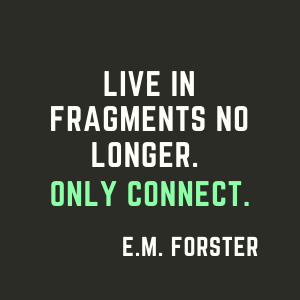
One of our deepest needs as human beings is for connection: to feel known, to feel understood, and to feel recognized and valued for who we are. However, in the social distancing culture of Covid-19, our experiences of – and opportunities for – human connection have not only become fragmented but in too many circumstances, they have totally discontinued.
For many educators and students in schools around the world, social distancing has led to unbearable states of disconnection, and thereby, to associated feelings of fear, loneliness, anxiety, and depression. In sum, this amounts to a series of unprecedented, collective, and ongoing experiences of loss and associated feelings of grief.
As I was reflecting on my own varying moods and feelings regarding these multiple losses, I was reminded of psychiatrist Dr. Elisabeth Kubler-Ross’s renowned Five Stages of Grief model. I first encountered and felt supported by these stages almost 30 years ago after the death of my father, but last week – quite unexpectedly – I realized how applicable these stages are for me now, too.
As I thought through these stages, I felt a surprising sense of relief as I realized that my fluctuating – and at times, very challenging – feelings felt somehow more understandable and tolerable, if not more “normal,” when considered within this useful theoretical framework. Even though these five stages were initially presented in a somewhat linear fashion – as if one doesn’t experience the feelings of Stage 2 until having endured or experienced the feelings of Stage 1 – this is not the case.
Since the initial publication of Dr. Kubler-Ross’s seminal work in 1969, practitioners and lay people alike have acknowledged how common it is to experience features of all five stages at different times, or even simultaneously, more like fluid “internal dynamics” of grief rather than linear and progressive stages. That was definitely the case for me.
In a recent Harvard Business Review (HBR) article, Scott Berinato explored these five stages of grief in the context of today’s coronavirus pandemic. To his summary, I have added brief descriptions of each stage and have paraphrased Berinato’s words here:
Denial: An initial refusal to acknowledge that the situation at hand is actually true (“Is this really happening?”)
Anger: Strong feelings of annoyance, frustration and irritation about the situation (“Our whole lives are so disrupted: We want to return to our normal lives!”)
Bargaining: Attempting to negotiate terms for a better outcome (“Ok, if we all shelter in place and maintain social distancing, we’ll be ok, right?”)
Depression: Prolonged … or intermittent … feelings of sadness, anxiety, and pessimism (“I’m so sad, and I don’t know when this whole situation will end.”)
Acceptance: Surrendering to the reality that this crisis is truly happening (“This is happening. I need to figure out how to proceed and adapt.”)
As you read through these five stages – or dynamics – of grief, you may identify, as I did, with these feelings and perhaps find some comfort in the realization that your feelings are both legitimate and typical. You are not alone. In fact, from much of the reading I’ve been doing throughout this crisis, I have observed that people all around the world are experiencing very similar feelings, confirming Dr. Kubler-Ross’s initial perception, if not her conviction, that these stages of grieving are universal.
Without a doubt, educators, students, and their parents everywhere are, collectively, experiencing multiple and simultaneous losses:
- the loss of not being able to gather together for classes and meetings;
- the loss of not being able to meet friends and colleagues for meals in school cafeterias;
- the loss of not sharing spring on the same campus;
- the loss of not being able to celebrate – in person – schools’ and colleges’ traditional and time-honored year-end rituals and ceremonies (proms and graduations, etc.);
- perhaps mostly, the deep loss of not being able to just hang out with each other.
To be sure, these are profound losses. Please be assured that it is absolutely normal and healthy to respond to these losses with the varied feelings and dynamics of grief they naturally evoke. In the words of Scott Berinato in the HBR, “If we can name it, perhaps, we can manage it.”
In my 30-plus years as a psychotherapist, a clinical phenomenon I have observed many, many times — and have come to know deeply — is that language – the “naming it” – is one of the greatest organizers of our emotional experiences. Why else do you think Sigmund Freud termed the process of psychotherapy as “The Talking Cure?”
As we continue to muddle through the coming weeks and months, my hope for all of us is that the language of these Five Stages of Grief can provide a useful emotional framework within which to understand, and perhaps, manage our feelings more effectively.
To conclude, I want to offer a message of hope. Another one of Dr. Kubler-Ross’s well-known quotations is this: “The most beautiful people we have known are those who have known defeat, known suffering, known struggle, known loss, and have found their way out of those depths.” [1]
As an experienced psychotherapist, I encourage you to make an effort to name your feelings. Further, try to acknowledge that while you are – as we all are – experiencing suffering, struggle, and loss, we also have the empathetic capacities within us to be gentle with ourselves and with those around us; to be kind and caring to ourselves and others, and to join forces with one another – even if by phone or online via Zoom or Skype – to “find our way out of those depths” together as we strive to live in fragments no longer, and only connect.
[1] Kubler-Ross, E., On Death and Dying. The Macmillan Company, New York, 1969


